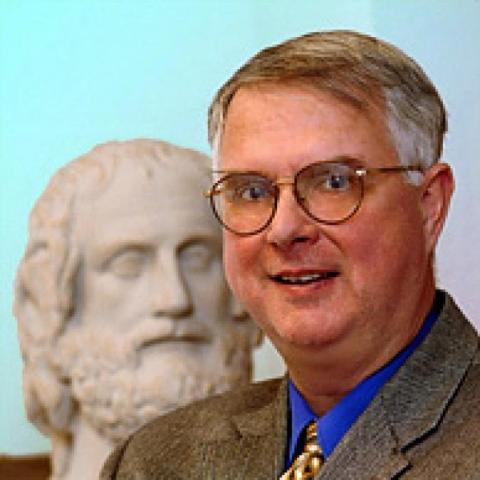
David Kovacs

Research Interests
I have a long-standing interest in text-critical problems as well as in the literary interpretation of Greek tragedy. Other areas of current interest include Horace and Pindar.
I have long believed that it is unwise to keep literary interpretation and establishment of the text in separate compartments. Literary interpretation (sometimes implicit) informs the editor's work, and if it is not adequate interpretation, the editor can be led astray. Likewise credulity about the soundness of the text makes literary interpretation less likely to succeed. Interpreting antiquity is a historical enterprise, and we cannot afford to ignore any of the evidence.
Selected Publications
- The Andromache of Euripides: An Interpretation (Scholars Press: Chico, CA, 1980).
- The Heroic Muse: Studies in the Hippolytus and Hecuba of Euripides (Johns Hopkins University Press: Baltimore, 1987).
- Euripides. The Loeb Classical Library Euripides, Greek text and English translation (Harvard University Press), six volumes (1994-2002).
- Euripidea (E. J. Brill: Leiden, 1994). A companion volume to the Loeb Euripides, vol. 1.
- Euripidea Altera (E. J. Brill: Leiden, 1996). Notes on the text of the plays of vols. 2 and 3, continues Euripidea.
- Euripidea Tertia (E. J. Brill, Leiden, 2003). Notes on the text of the plays of vols. 4-6.
- "On Medea's Great Monologue (Eur. Medea 1021-1080)," CQ 36 (1986), 343-352.
- "Where is Aegisthus' Head?" CP 37 (1987), 139-141.
- "Ovid, Metamorphoses 1.2," CQ 37 (1987), 458-465.
- "Treading the Circle Warily: Literary Criticism and the Text of Euripides," TAPA 117 (1987), 257-270
- "Zeus in Euripides' Medea," AJP 114 (1993), 45-70.
- "The Theology of Euripides' Trojan Trilogy," Colby Quarterly 33.2 (1997), 162-76.
- "Toward a Reconstruction of Euripides' Iphigenia Aulidensis," JHS 123 (2003) 77-103.
- "Donne's Latin Poem on Jonson's Volpone: Some Observations and a Textual Conjecture," The International Journal of the Classical Tradition 12.4 (2006) 563-8.
- "Envy and Akrasia in Seneca's Thyestes,' Classical Quarterly 57 (2007) 787-91.
- "And Baby Makes Three: Aegeus' Wife as Mother-to-be of Theseus in Euripides' Medea," Classical Philology 103 (2008) 298-304.
- "The Role of Apollo in Oedipus Tyrannos," in J. R. C. Cousland and J. R. Hume (edds.), The Play of Texts and Fragments: Essays in Honour of Martin Cropp (Leiden 2009), 357-68.
- "Double Trouble: duplicis at Horace, Odes 1.6.7 and the limits of ambiguity," Illinois Classical Studies 31-2 (2006-7 [nominally: actually 2009]) 55-74.
- "Do We Have the End of Sophocles' Oedipus Tyrannos?" Journal of Hellenic Studies 129 (2009) 53-70.
- "Horace, Pindar, and the Censorini in Odes 4.8," Journal of Roman Studies 99 (2009) 23-35.
- "Herodotus 1.53.1-2: What were Croesus' Instructions?" Scripta Classica Israelica 29 (2010) 1-4.
- "The Second Person Indefinite and the Logic of Horace, Odes 1.1.29-36," Philologus 154 (2010) 304-13.
- "Vergil, Ecl. 4.53-4: enough of what?" Classical Quarterly 61 (2011) 319-20.
- "When giants stumble: two influential misjudgements on Horace's Odes (2.20.5-6 and 3.30.10-14)," Philologus 155 (2011) 156-66.
- "Two Conjectures in Horace: Odes 1.16.8 and 1.35.25," Classical Quarterly 63 (2013) 339-45.
Forthcoming
- Under contract with Oxford University Press: a commentary on Euripides' Troades.
Personal
I grew up in Ohio and took a B.A. in classics and philosophy from the College of Wooster in Wooster, Ohio. I did my M.A. and Ph.D. at Harvard. I came to Virginia in 1976, where I have served as Chairman of the Department as well as Director of Graduate Studies and Director of Undergraduate Studies. My wife, also an Ohioan, is a member of the Religious Studies Department and teaches New Testament Greek, early Christianity, and (occasionally) Old Testament. We have two children, one of whom graduated from U.Va. When not teaching or doing research I am a dedicated amateur musician and sing in an early music ensemble that performs everything from Machaut, Taverner, and Josquin Desprez down to Purcell and Bach, with the occasional foray into the twentieth century.